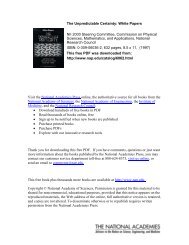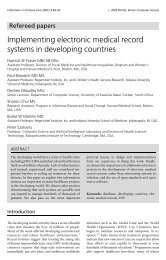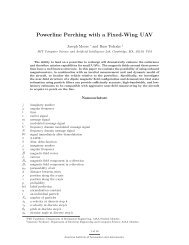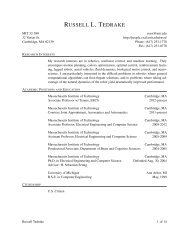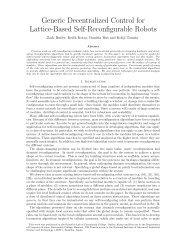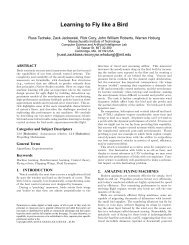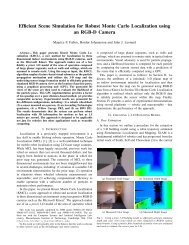Online Social Networks and E-Commerce - MIT Computer Science ...
Online Social Networks and E-Commerce - MIT Computer Science ...
Online Social Networks and E-Commerce - MIT Computer Science ...
You also want an ePaper? Increase the reach of your titles
YUMPU automatically turns print PDFs into web optimized ePapers that Google loves.
Clarence Lee <strong>and</strong> Shirley Fung<br />
It has been nearly ten years since the release of that report, <strong>and</strong> the Internet has dramatically changed<br />
since then. Given the increased level of comfort that consumers feel with online shopping as well as the<br />
current Web 2.0 boom of social networking sites, personal data stored on the Internet has grown<br />
exponentially. From the cases aforementioned, it is clear that some action needs to be taken in order<br />
safeguard consumer data.<br />
While drafting an over-arching government legislature would be the best option in protecting consumer<br />
privacy, it would be unfeasible given the current United States economic <strong>and</strong> political environment. In<br />
addition, doing so would violate the American laissez-faire economic philosophy that has guided the<br />
American economy for many years. What we are proposing is to follow the current adoption-as-needed<br />
approach <strong>and</strong> to create an accountability structure specific to the electronic commerce industry. Given<br />
that the information stored on sites such as Facebook <strong>and</strong> Amazon are similar to the financial <strong>and</strong><br />
personal information stored by banks <strong>and</strong> insurance agencies, we will discuss the history <strong>and</strong> policy<br />
implications of the Gram-Leach-Bliley Act.<br />
The Gramm-Leach-Bliley Act<br />
The Gramm-Leach-Bliley Act (GLBA) was passed in 1999 as an effort to modernize the financial industry.<br />
After the Great Depression, Congress passed the Glass-Steagall Act to prohibit the merger between<br />
national <strong>and</strong> state banks with security companies. In 1956 <strong>and</strong> 1982, Congress passed <strong>and</strong> amended the<br />
Bank Holding Company Act that forbids a bank from controlling a non-bank company <strong>and</strong> prevented<br />
insurance agencies from merging with banks. Then, in 1999, GLBA allowed banks to engage in some of<br />
these previous activities (The Gramm-Leach-Bliley Act, 2005).<br />
One of the main reasons why banks <strong>and</strong> insurance companies were prevented from merging before is the<br />
fear of a merged company holding too much information about its clients. After GLBA, the banks that<br />
hold one’s financial information can merge with insurance companies that hold one’s medical record. This<br />
allowed the merged companies to sell consumer information to third parties that resulted in several<br />
prominent lawsuits that brought this problem to public attention.<br />
In 1997, Charter Pacific Bank of California sold customer information <strong>and</strong> credit card numbers to an adult<br />
Web site company. In turn, the adult Web site billed over 900,000 consumers for a total of 42 million<br />
USD for adult content access ($37.5 Million Judgment Against Porn Site, 2000).<br />
A year later, Nations Bank sold customer information to its subsidiary Nations Securities. Nations<br />
Securities in turn convinced many low-risk customers to invest in high-risk investments. Many low-risk<br />
customers, a majority were senior citizens, lost significant amounts of their life savings.<br />
From these examples, it is clear that self-regulation do not work when the interest of the business conflicts<br />
with protecting customer data. In the case of many social networking sites, where the main source of<br />
Page 32




![[ti]The “Vulgar Spirit of Blogging”: On Language, Culture ... - CSAIL](https://img.yumpu.com/18604217/1/190x245/tithe-vulgar-spirit-of-blogging-on-language-culture-csail.jpg?quality=85)




